Abstract
De-hospitalization of cancer treatment, particularly for those with advanced disease, can complicate adjustment and strain the capacity of caregiver networks to meet patients' daily needs. Outpatient staff should be able to recognize patients who need help to meet their daily needs as well as those who are not getting enough help. This study describes the physiological and social determinants of need and unmet need for assistance among 629 cancer patients with advanced disease initiating a course of outpatient chemotherapy and/or radiation therapy. Areas of needs examined through telephone interviews with participating patients were: personal care, instrumental tasks (housework, shopping, and cooking), and transportation. Physiological factors (metastases, disease stage, and functional status) were associated with need for assistance in all three areas. Also, older age (over 65) and low income predicted need for help with personal care, and women were more likely than men to report illness-related need for assistance with instrumental tasks and transportation. Unmet need was primarily associated with patients' social support system (e.g., children living nearby and perceived resiliency of network helpers). These findings highlight the need for outpatient staff to evaluate patients' informal care resources as well as patients' symptoms and impairments in deciding who should be referred for home care services.
Full text
PDF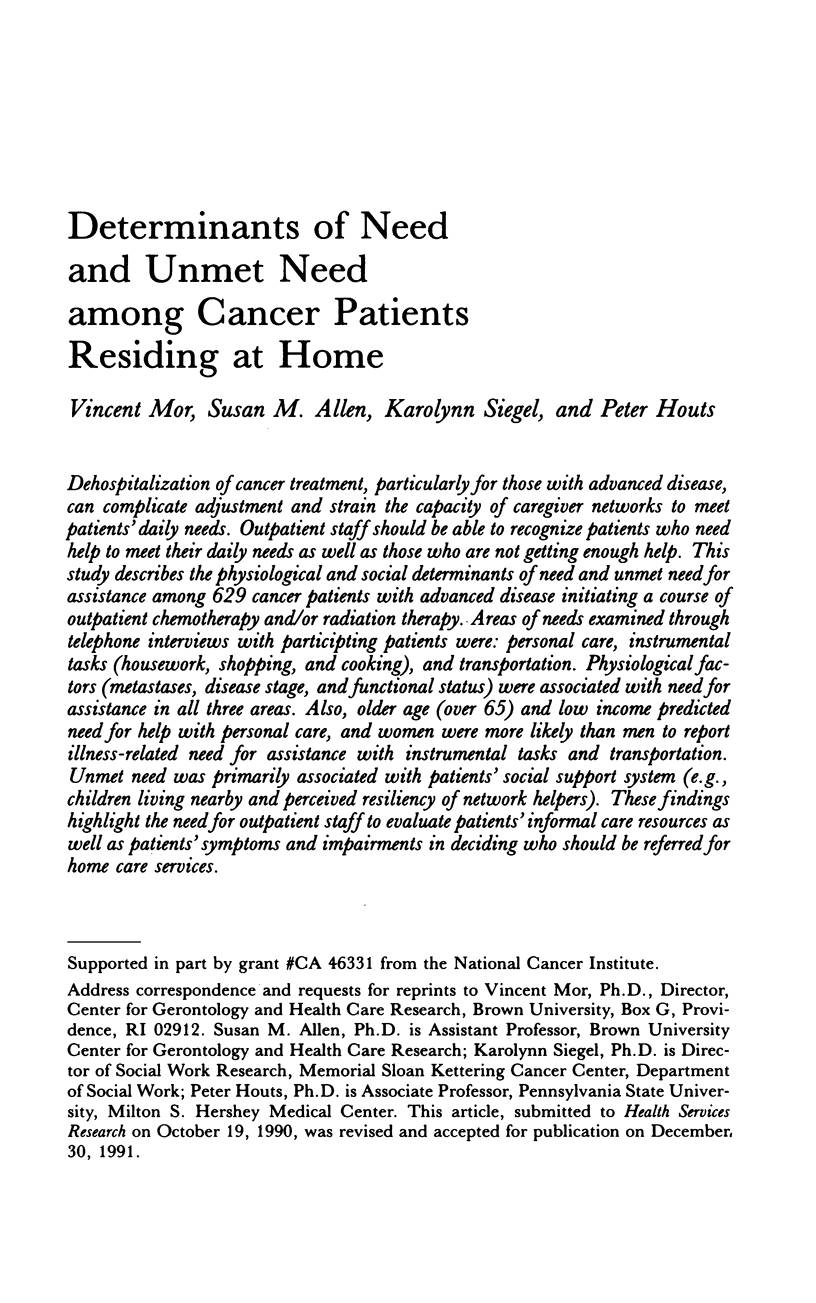
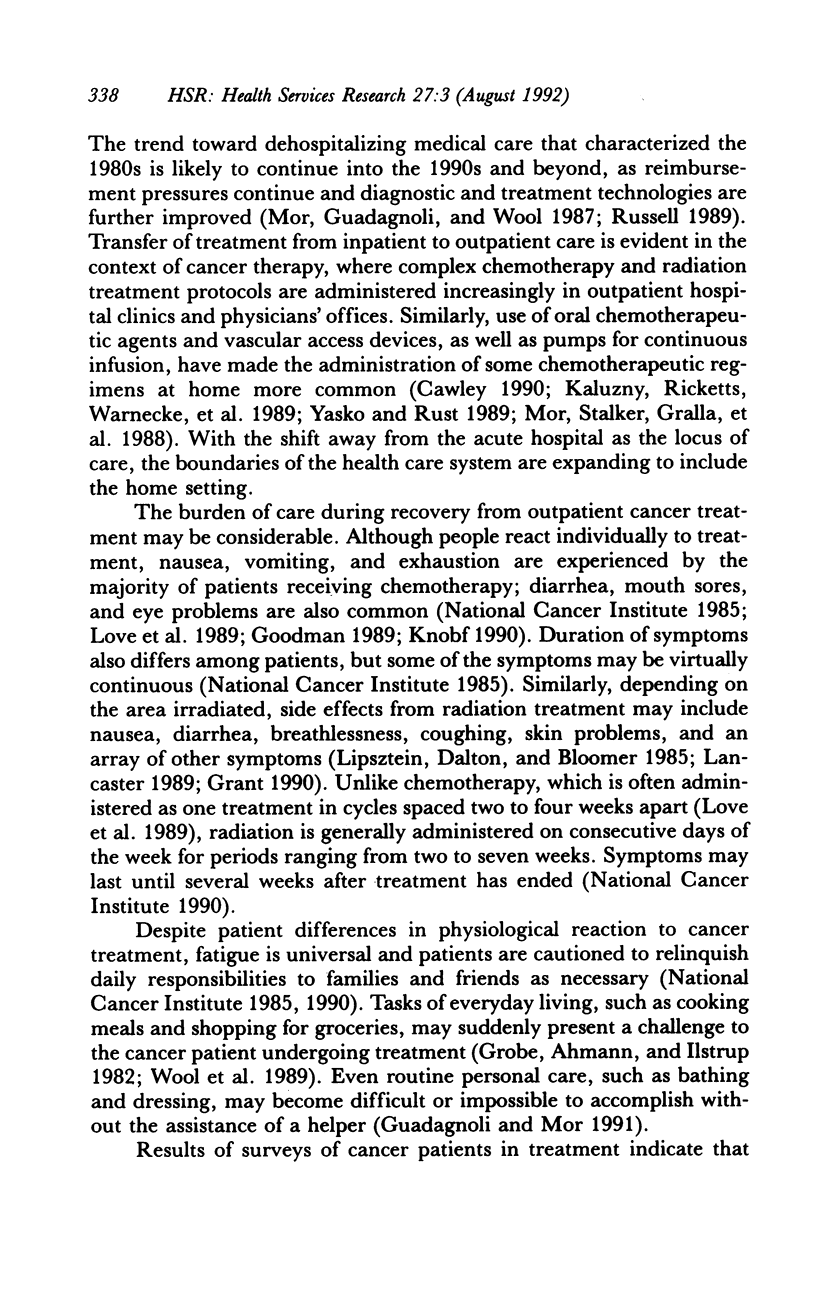
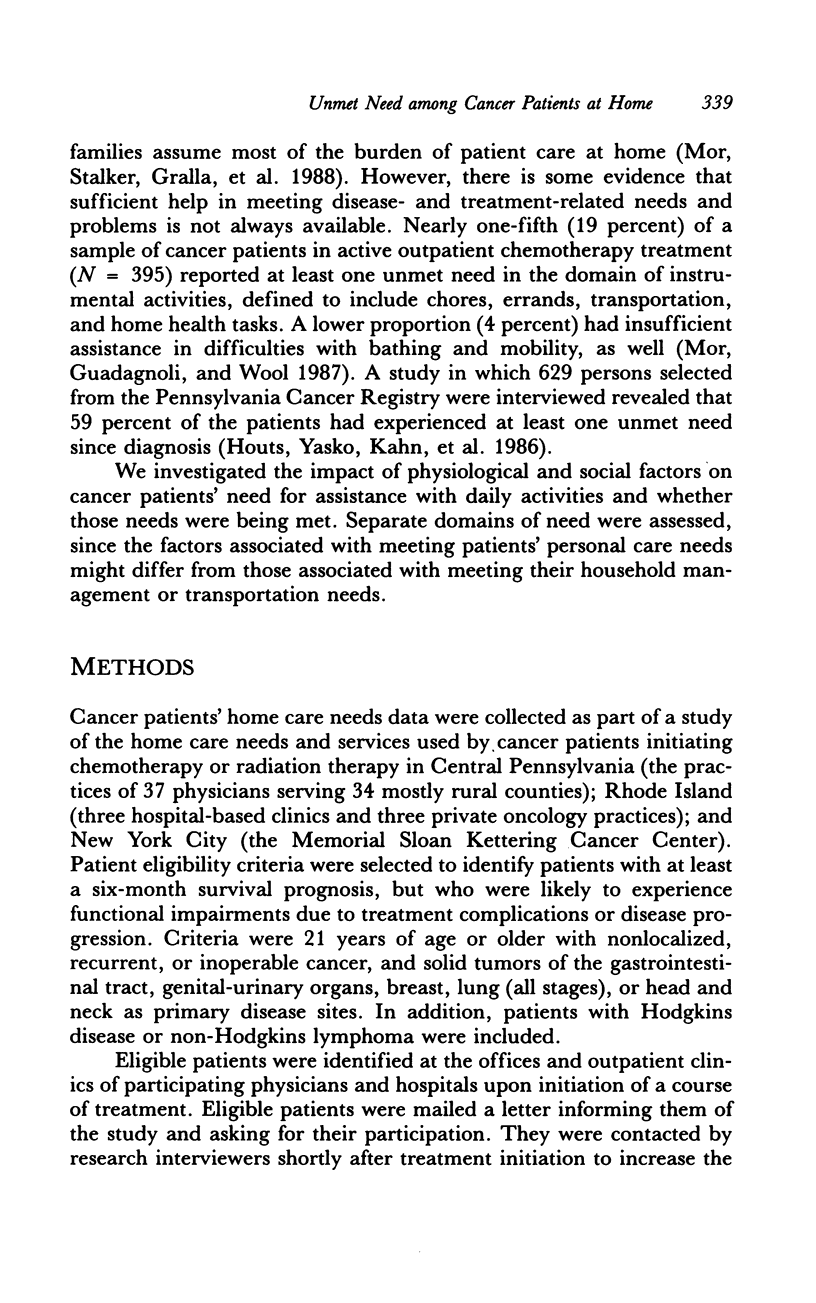
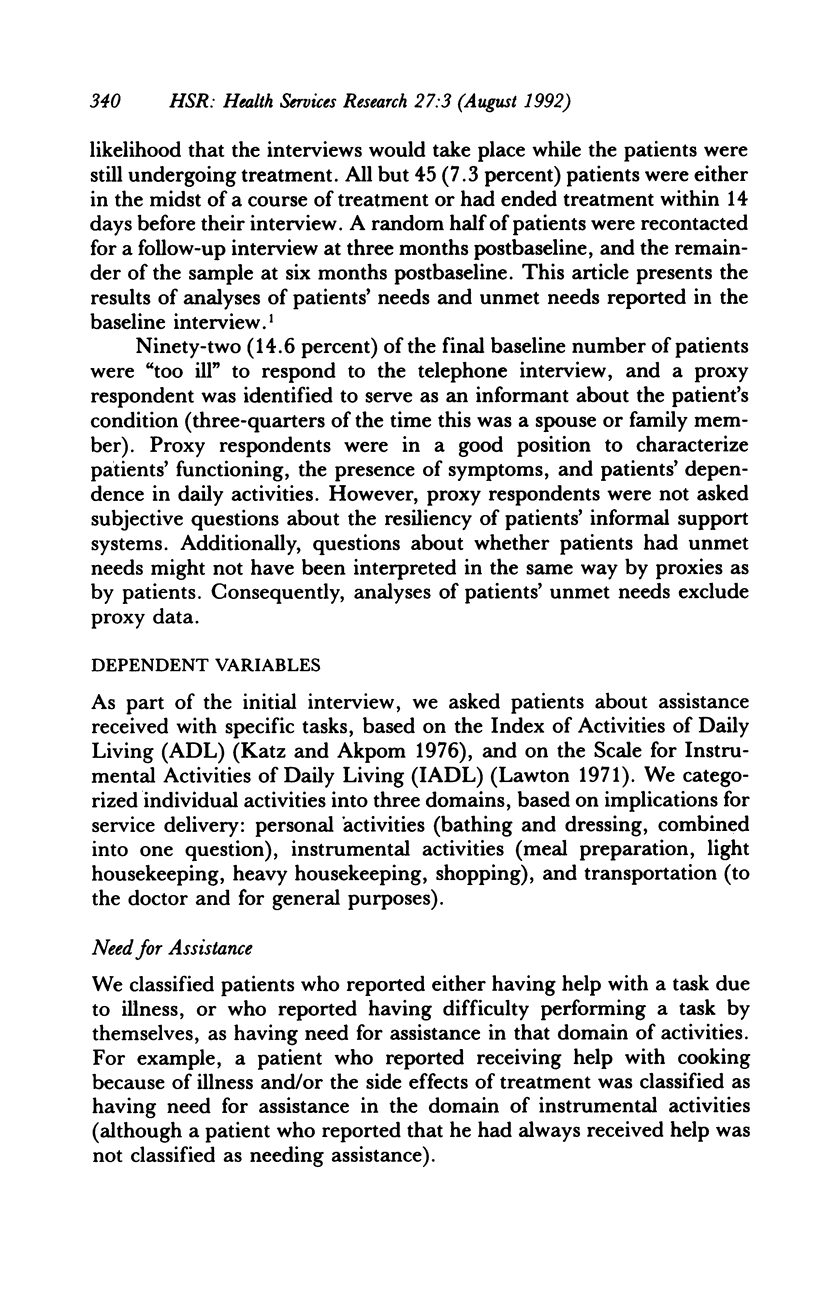
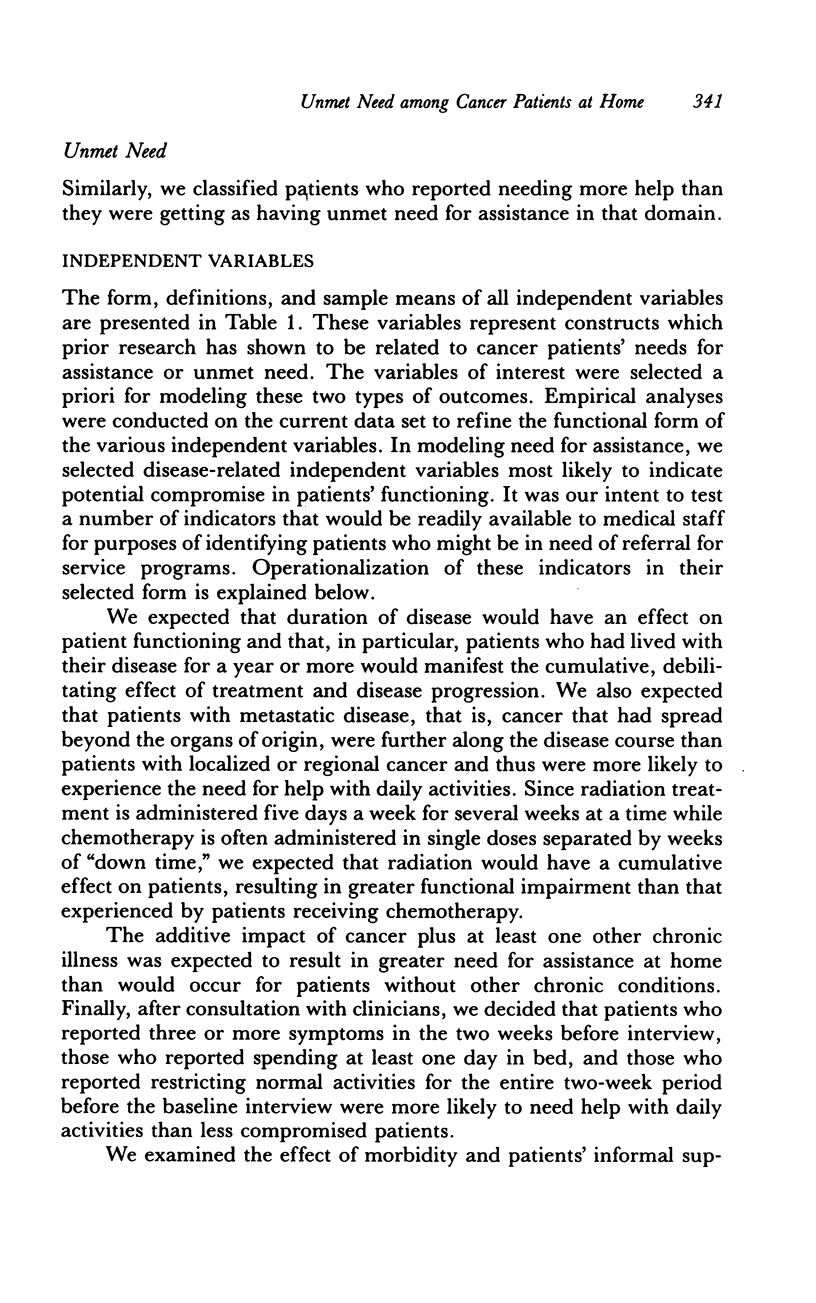
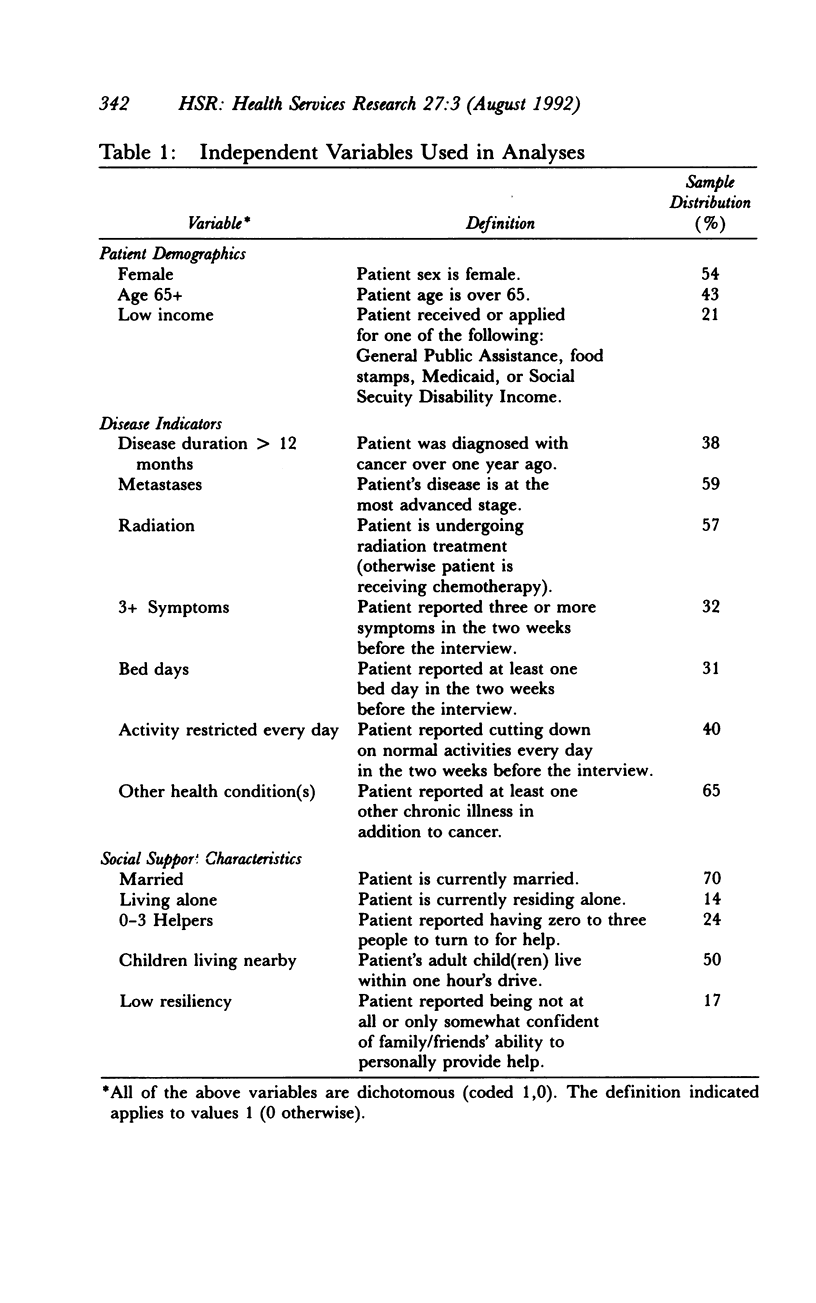
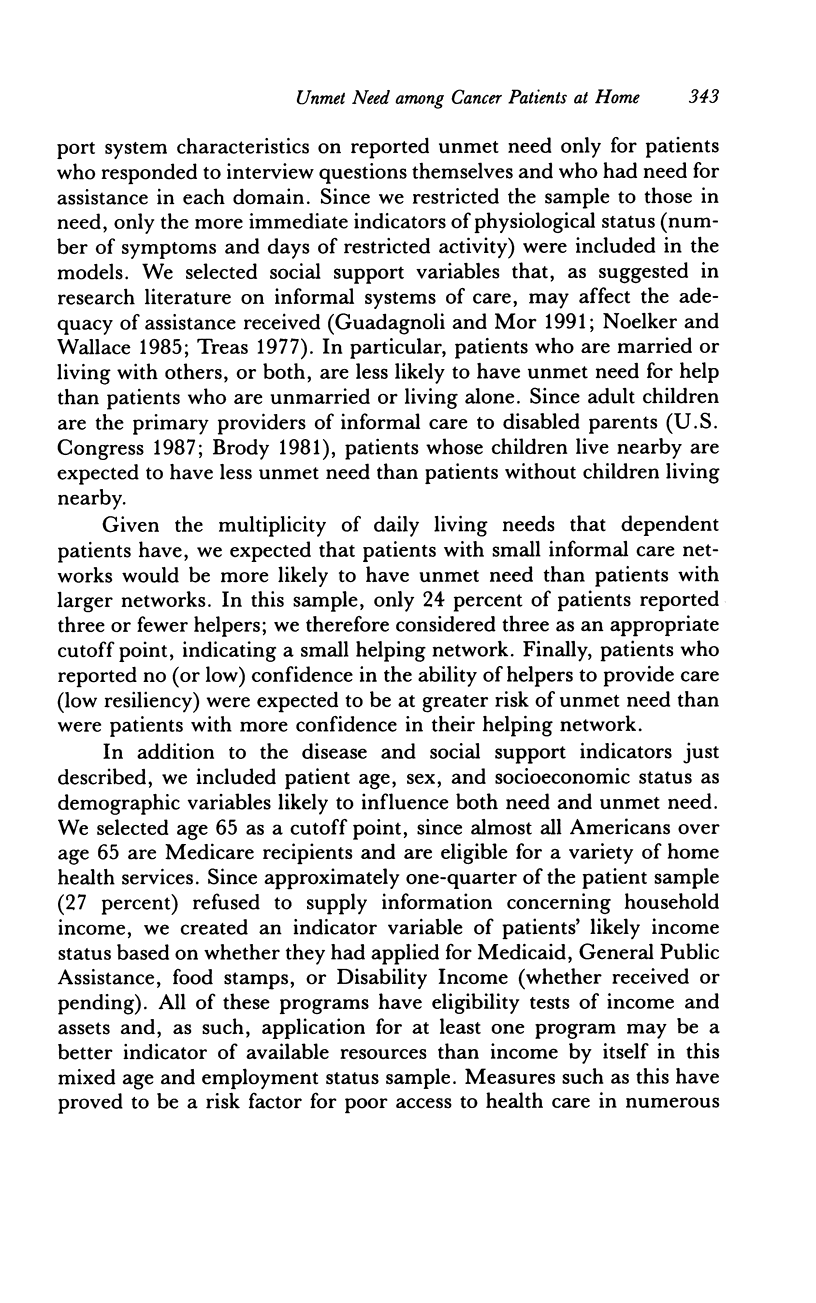
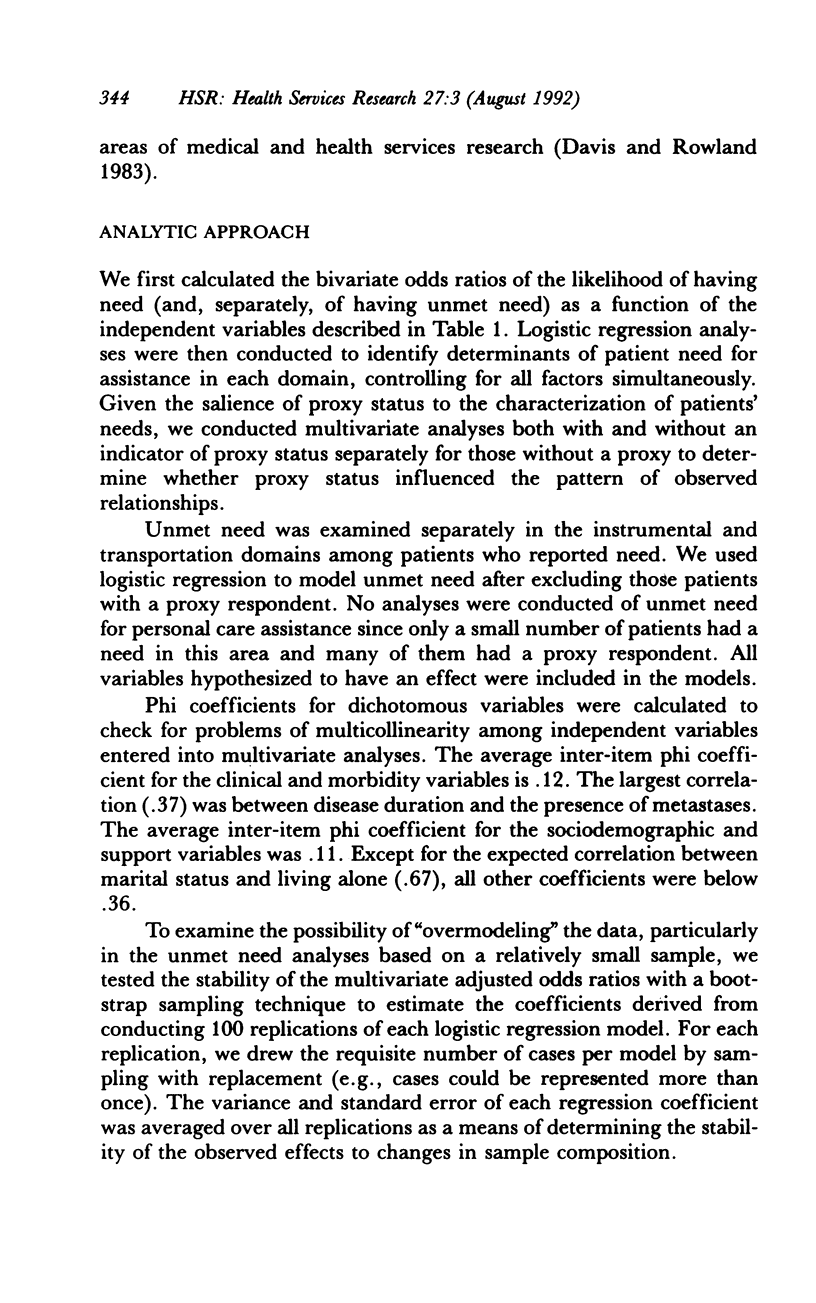
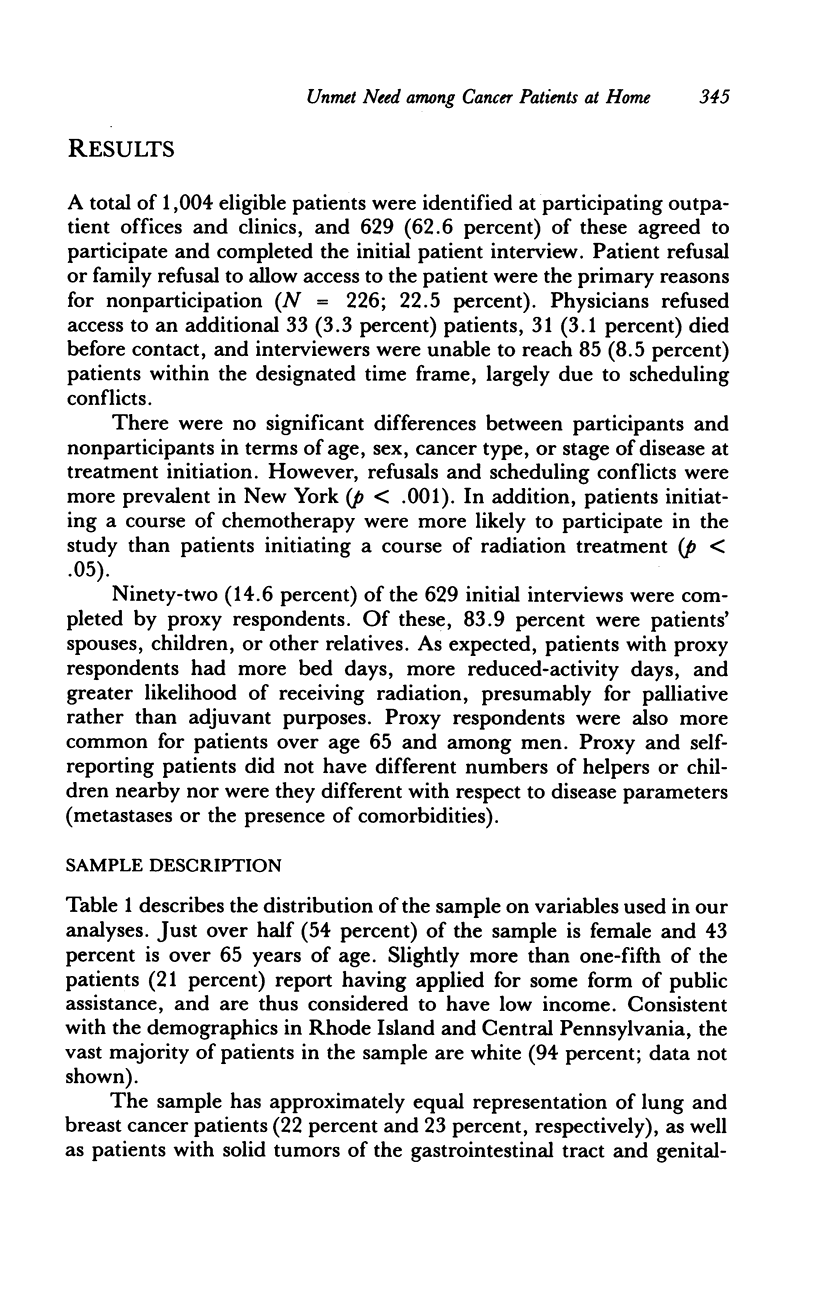
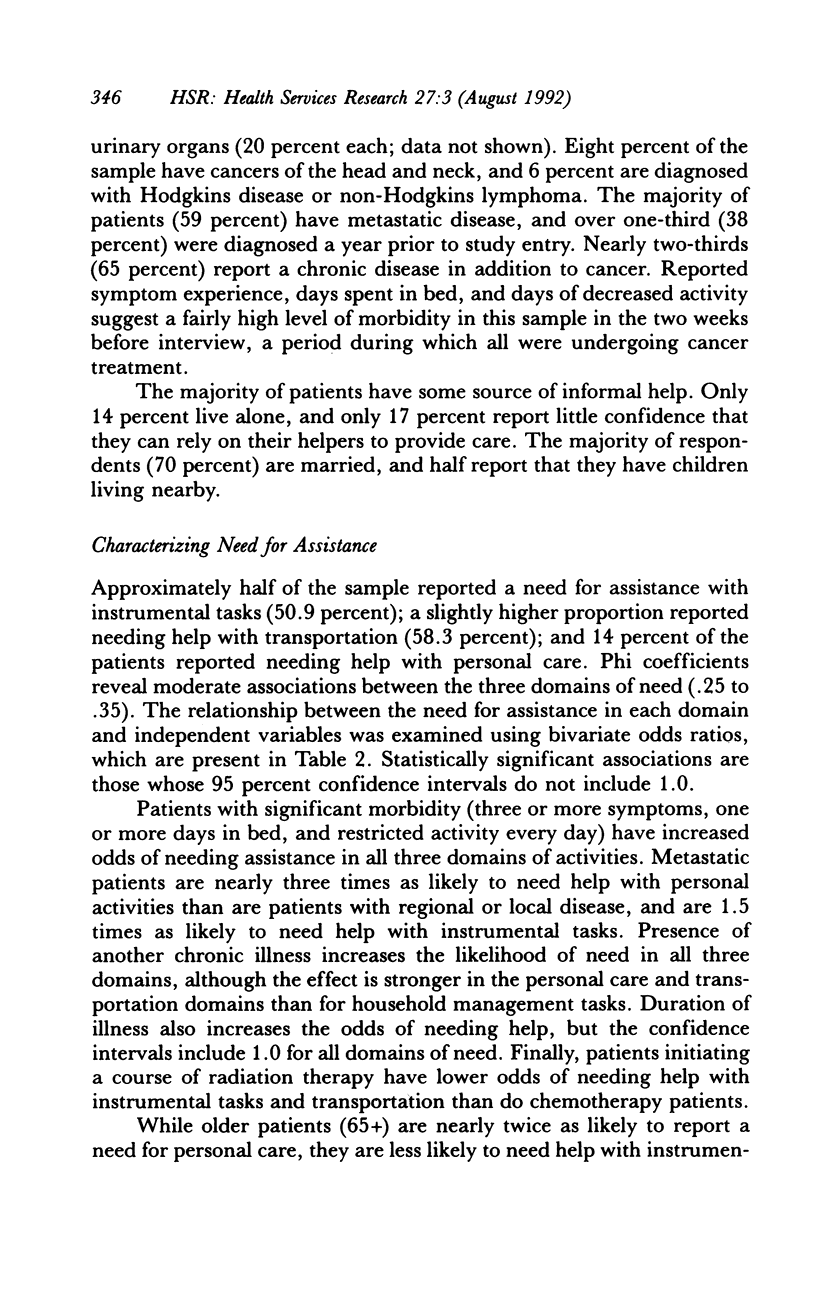
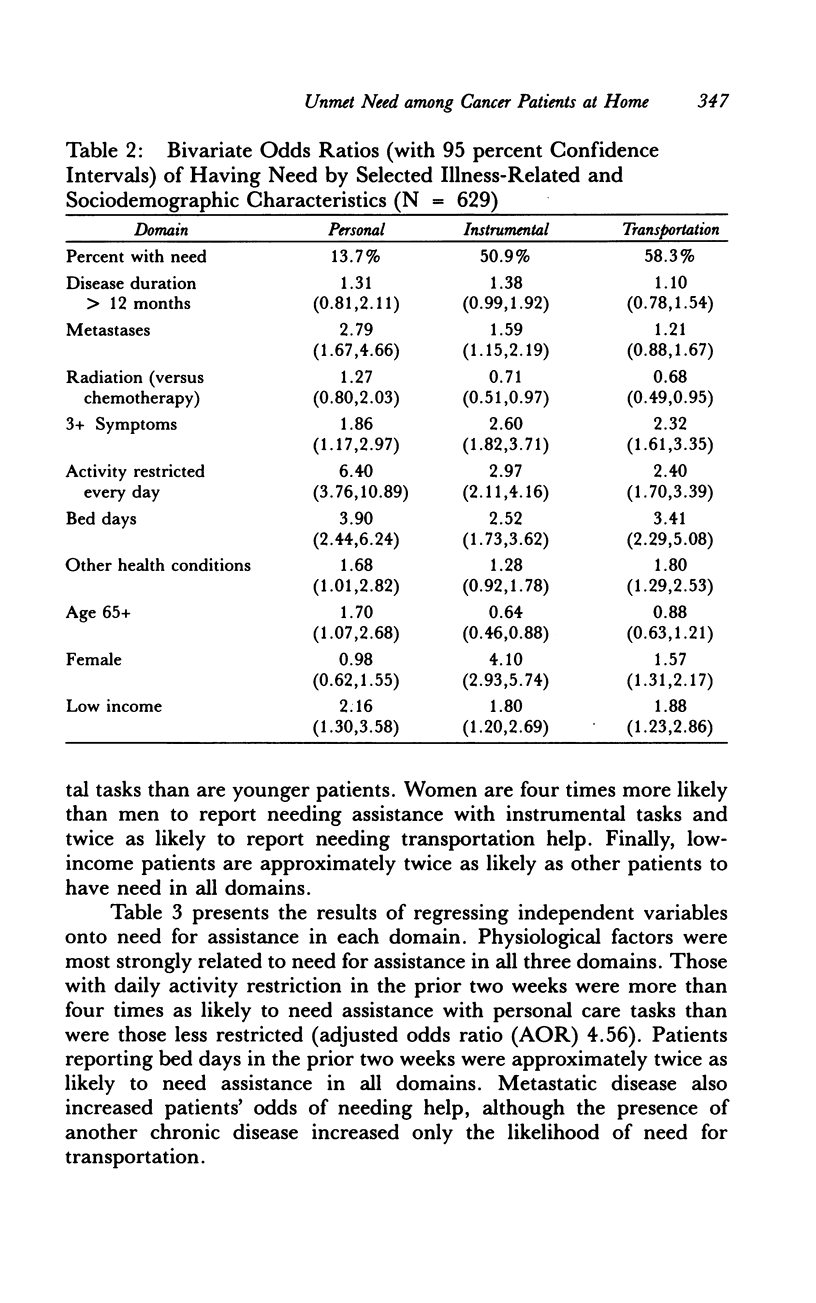
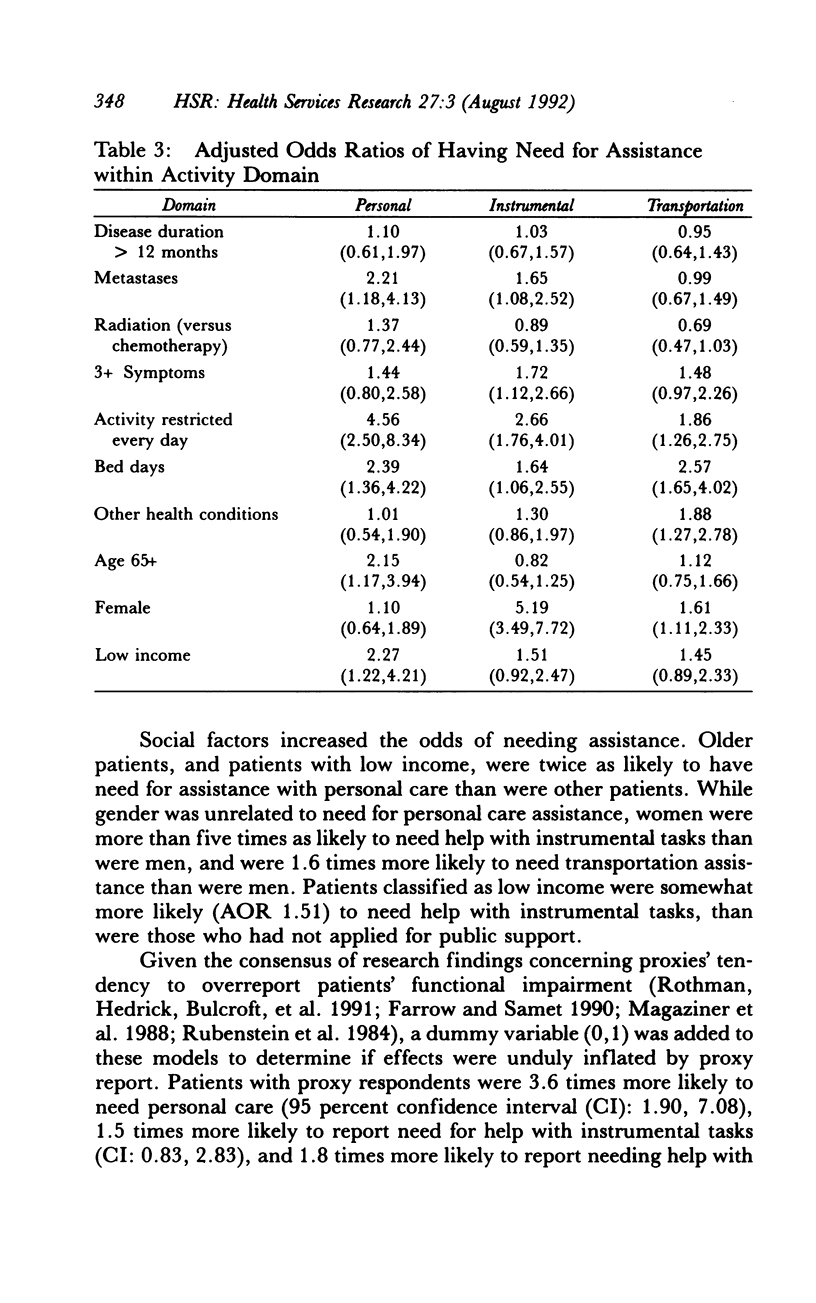
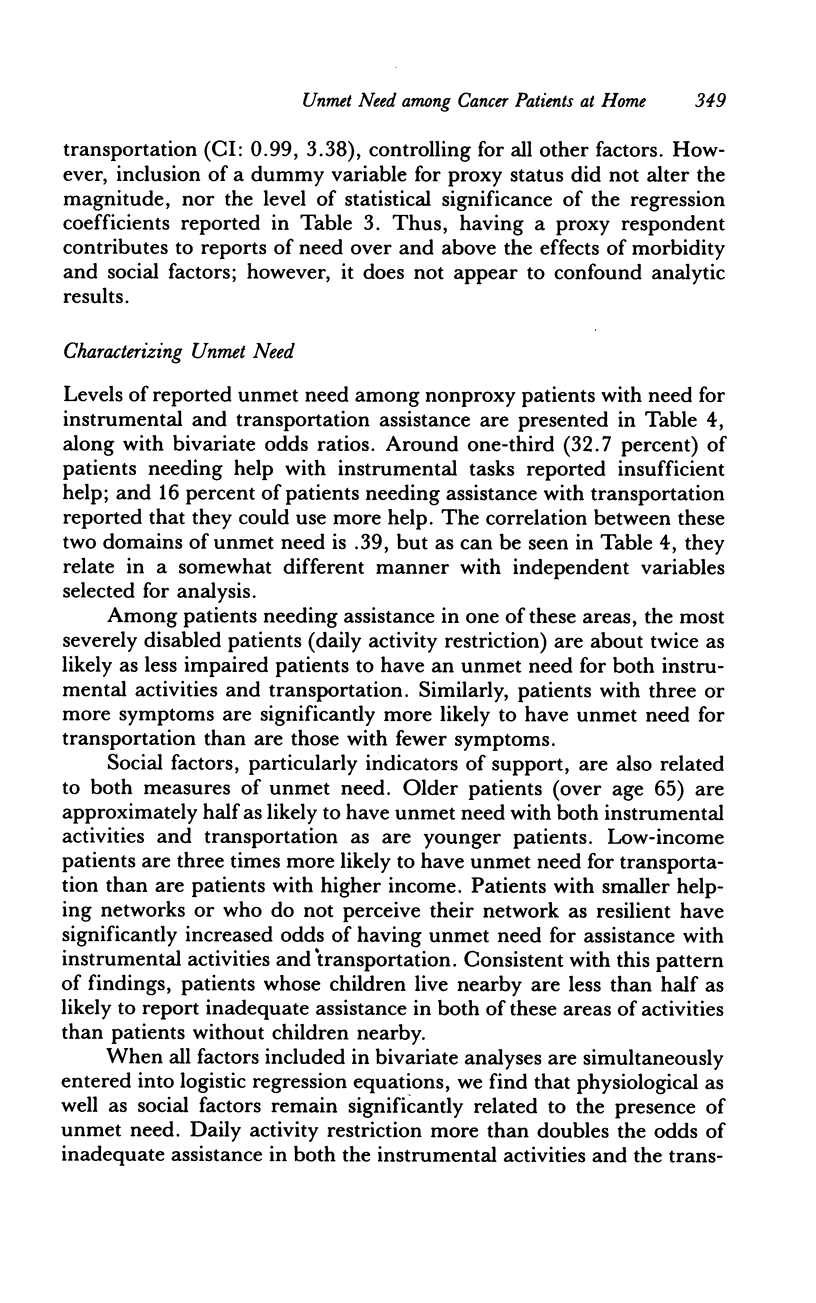
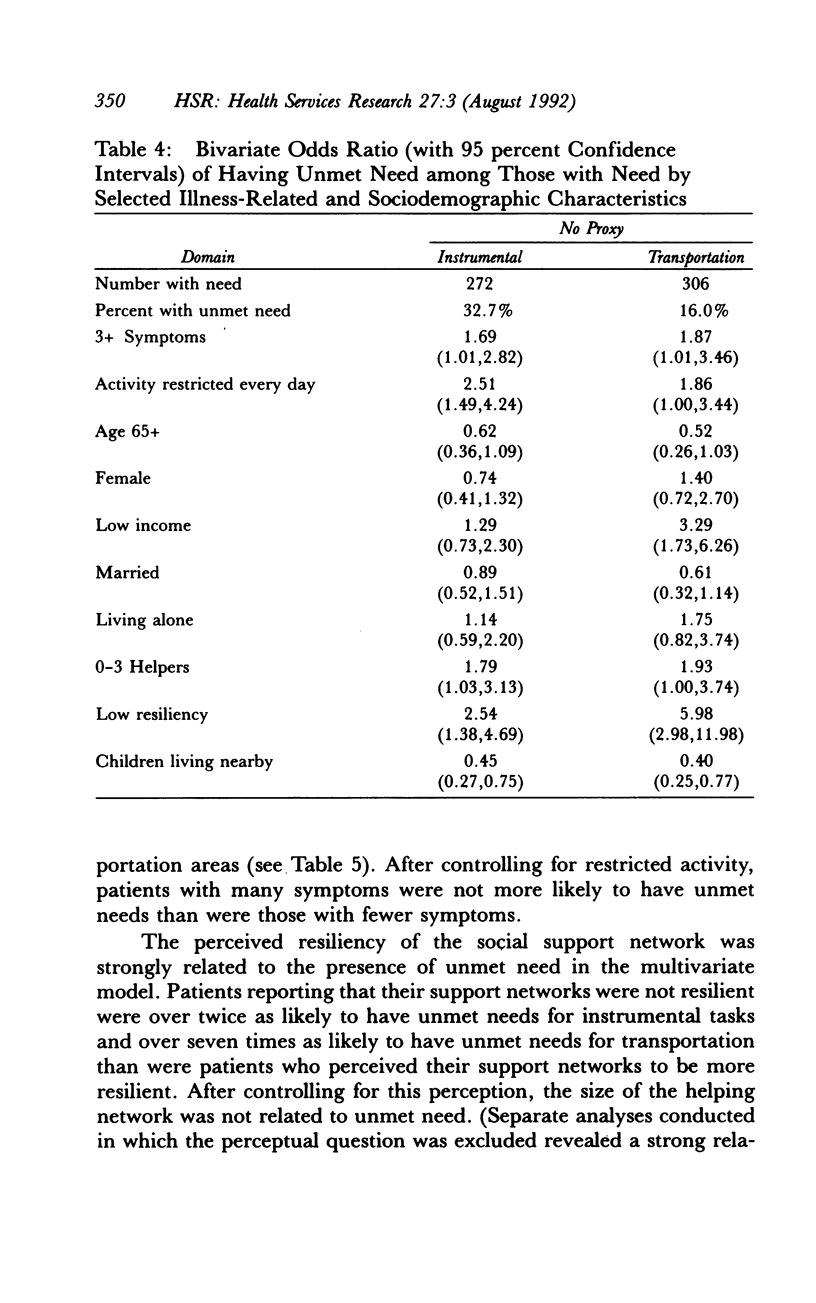
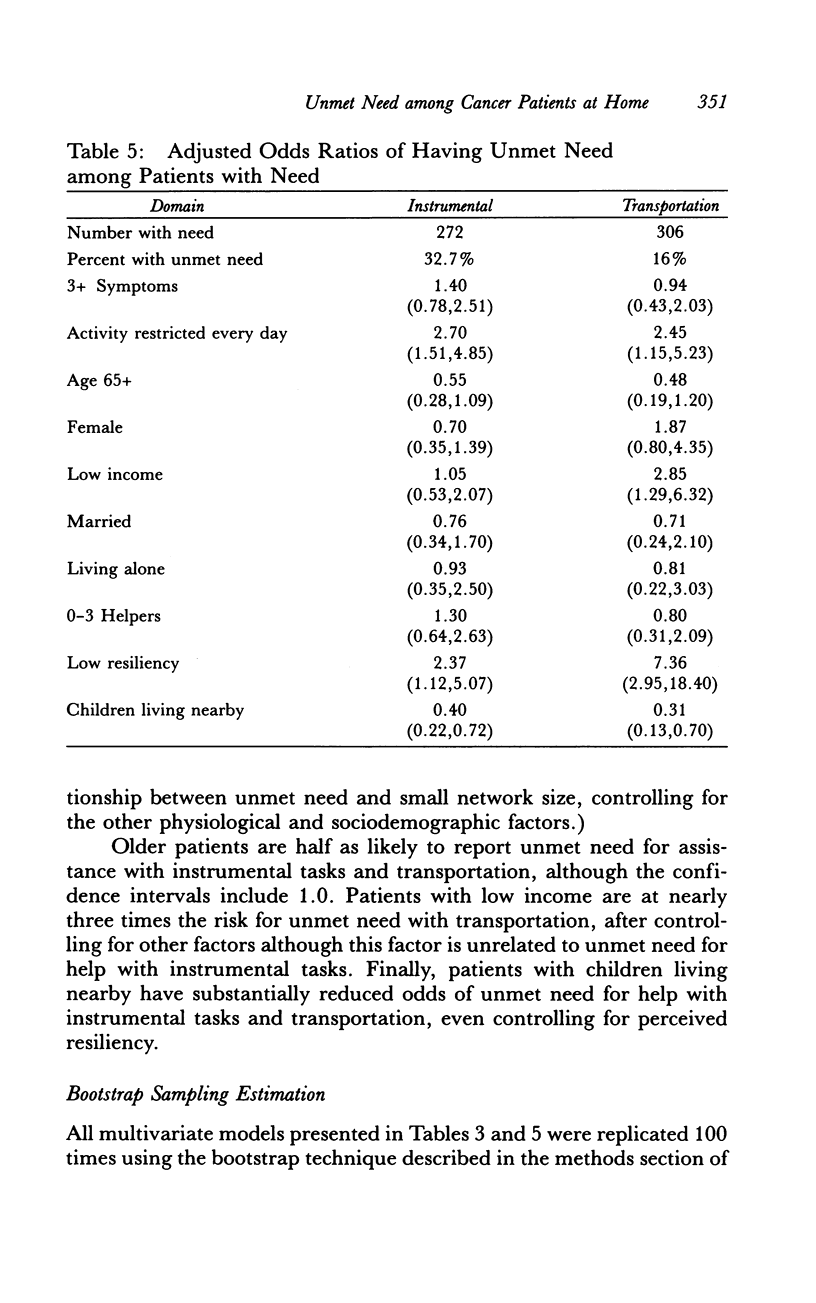
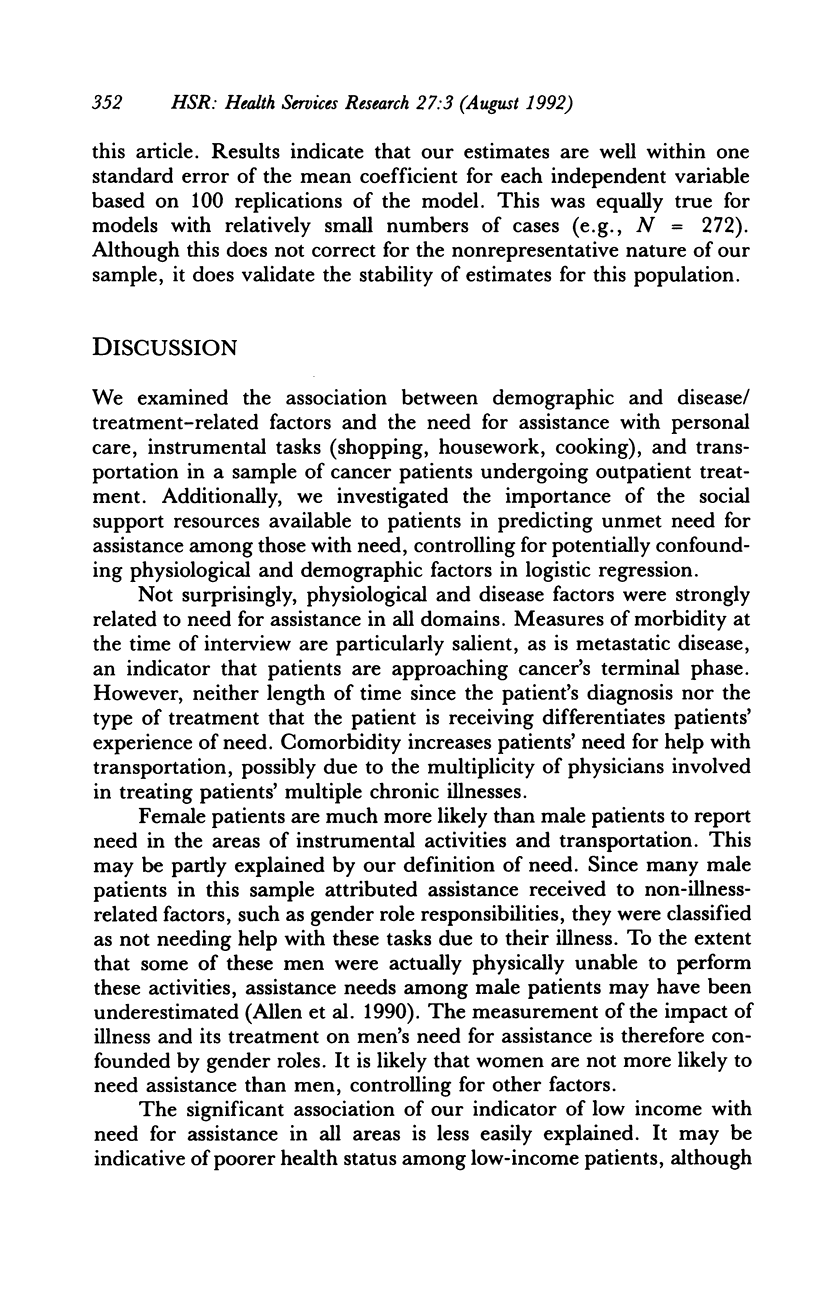
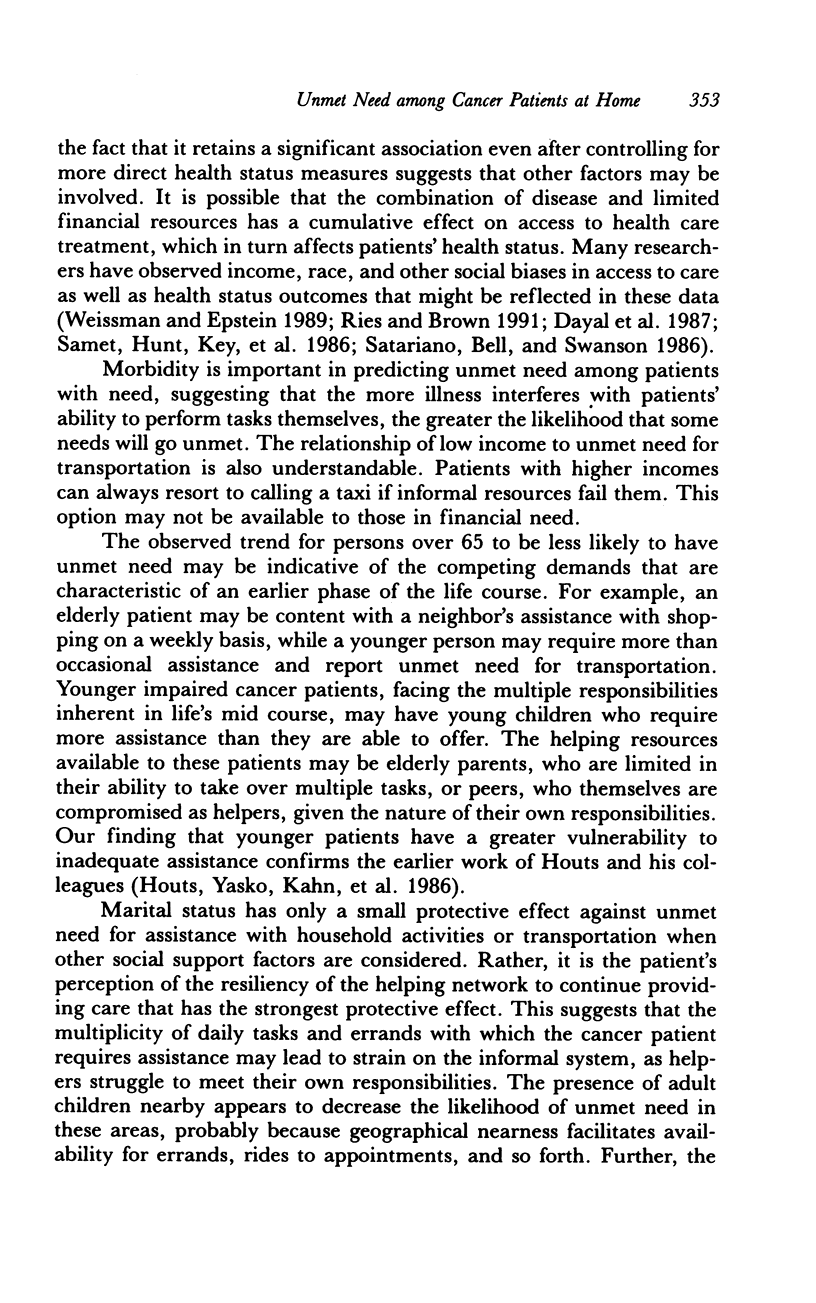
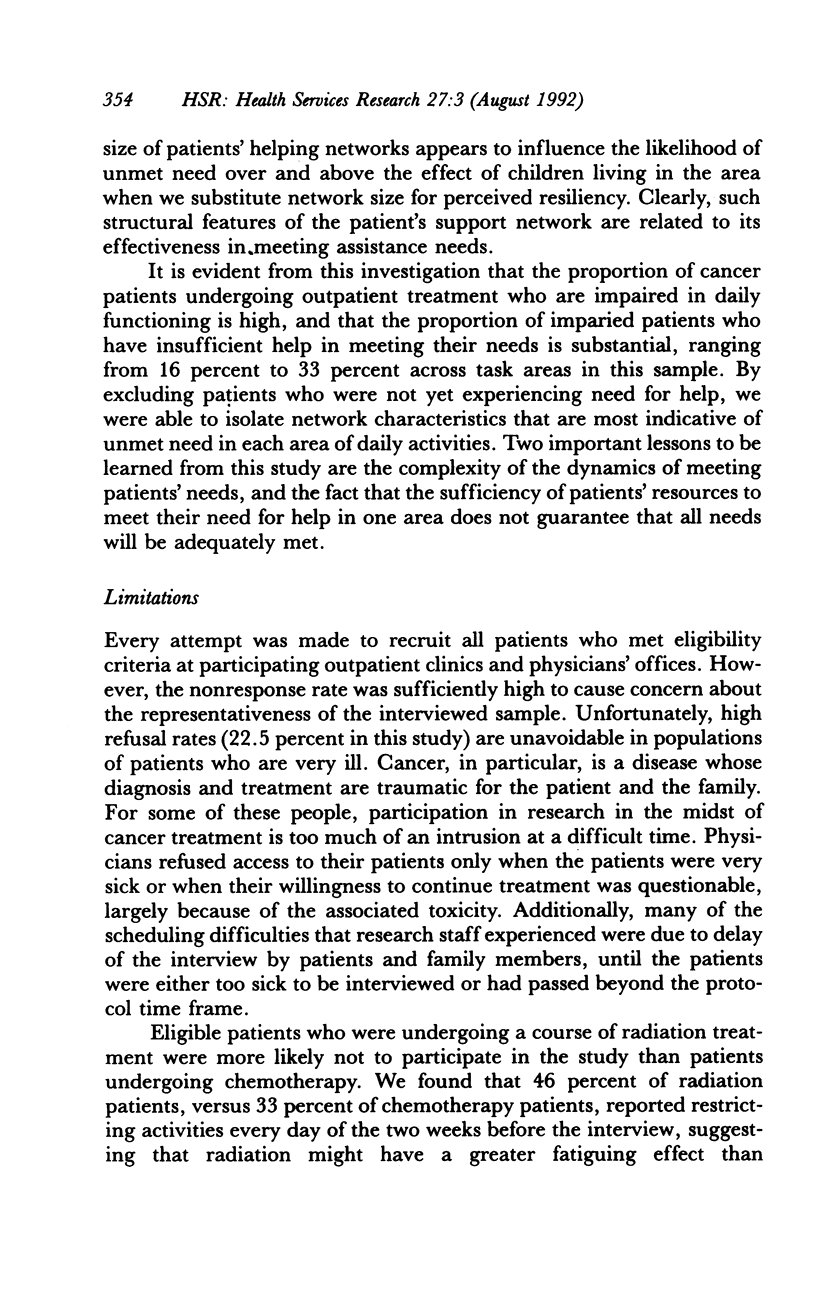
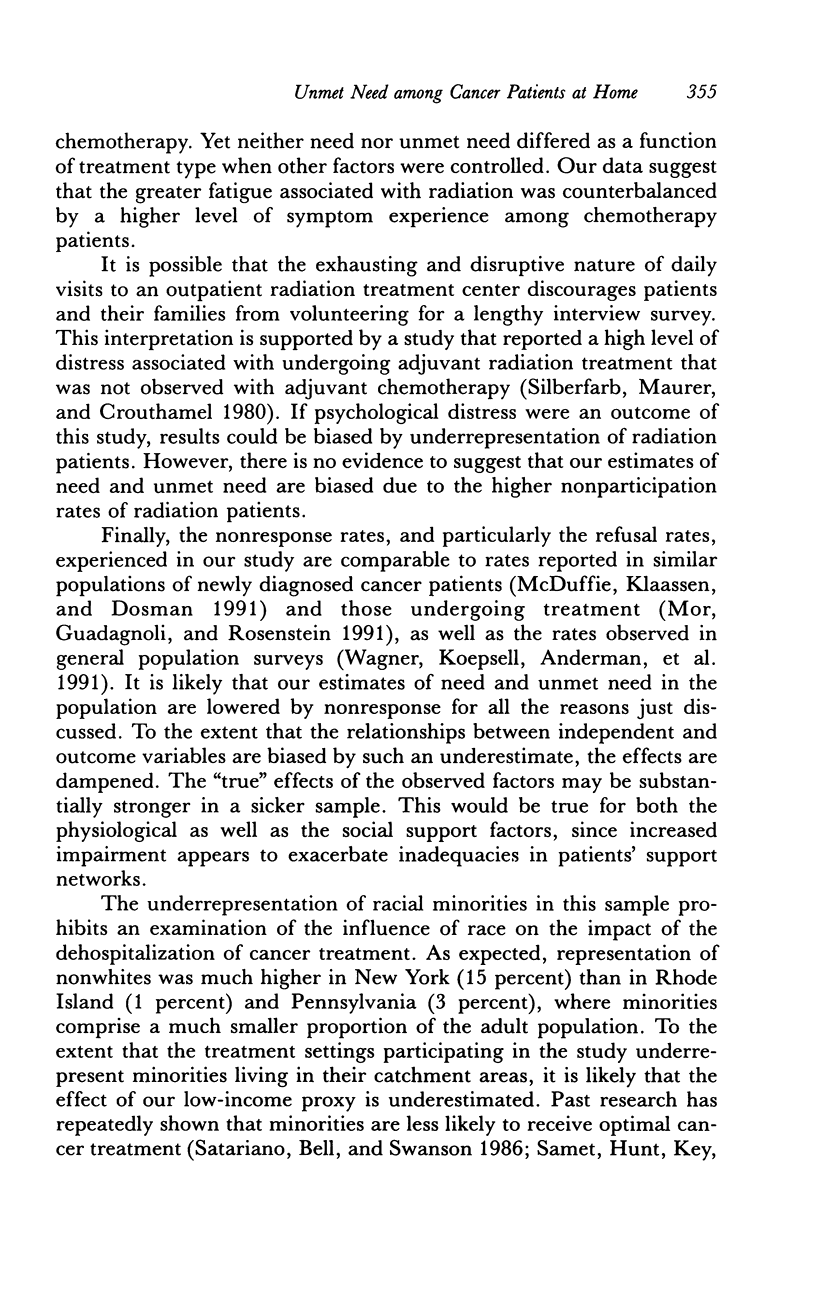
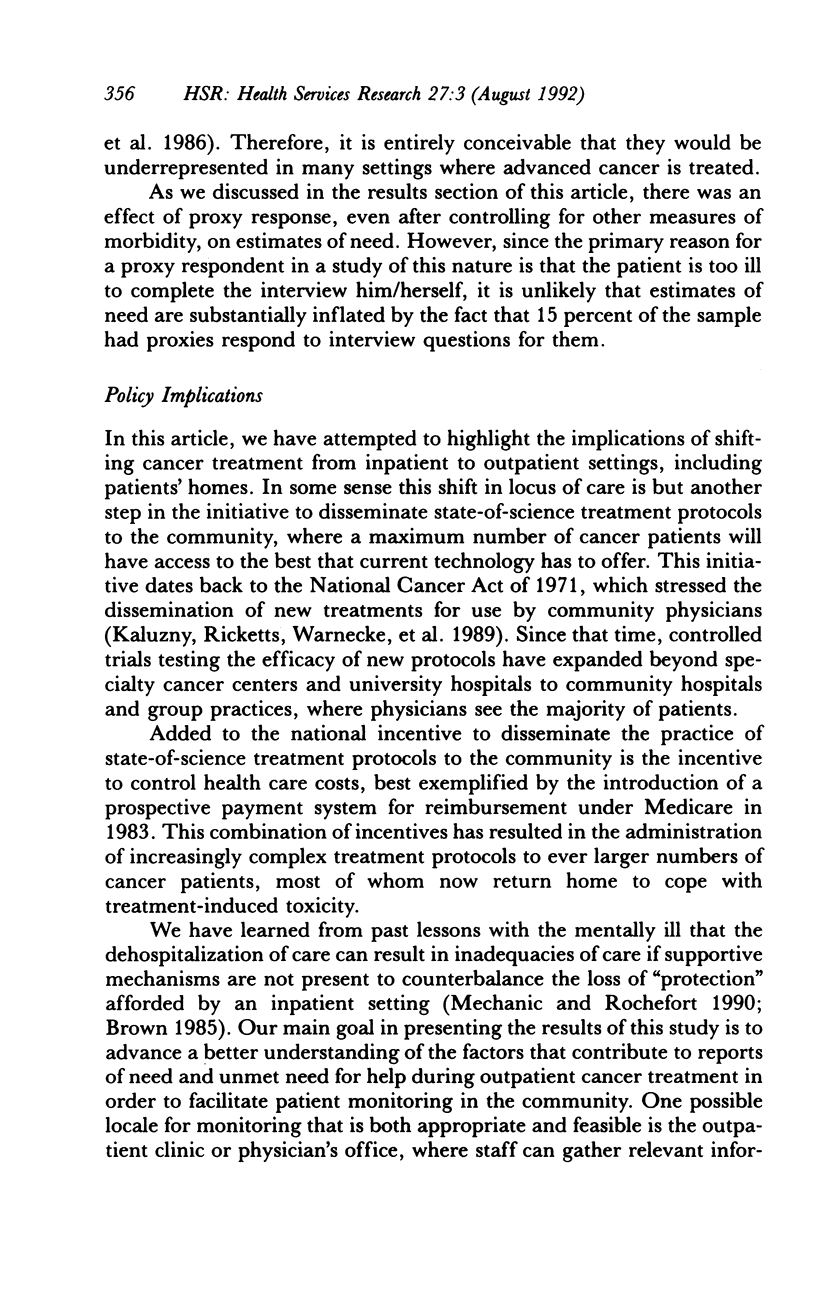
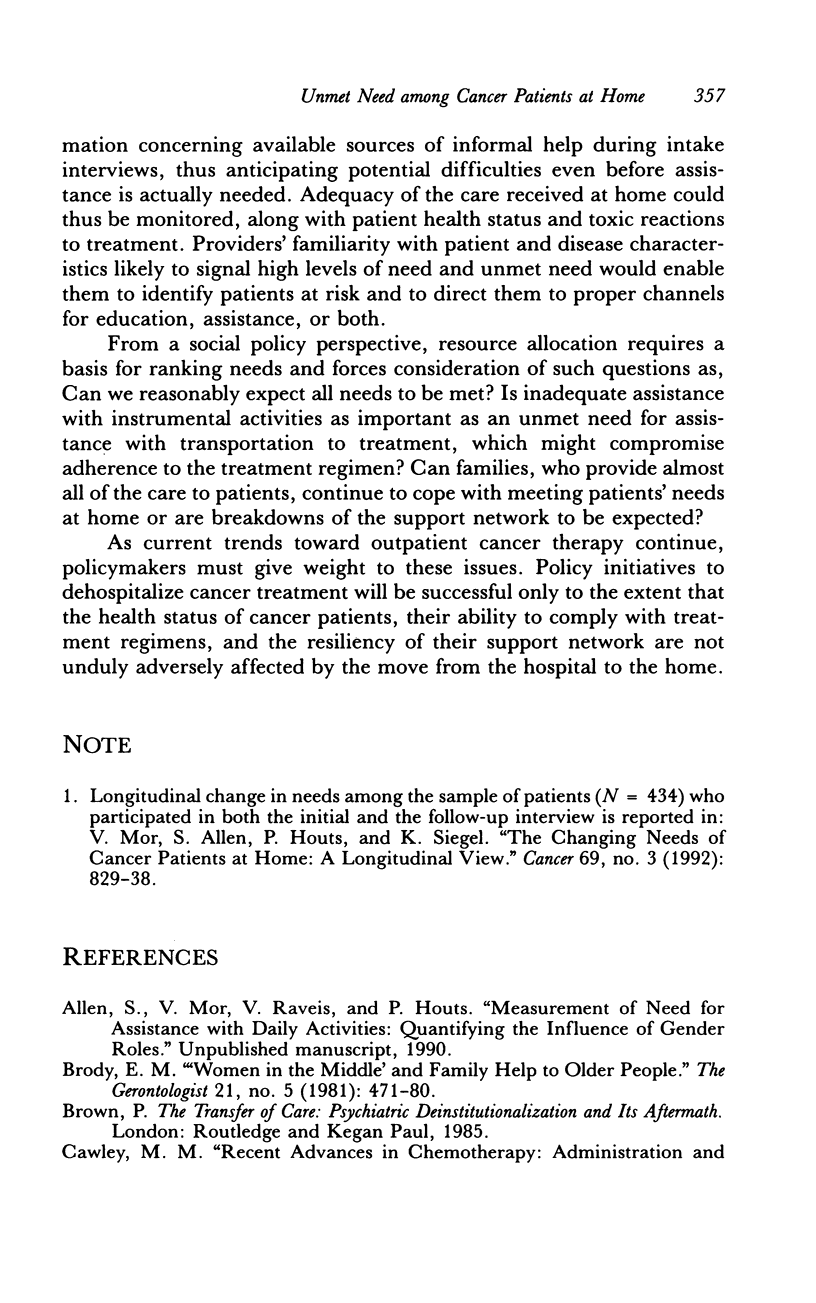
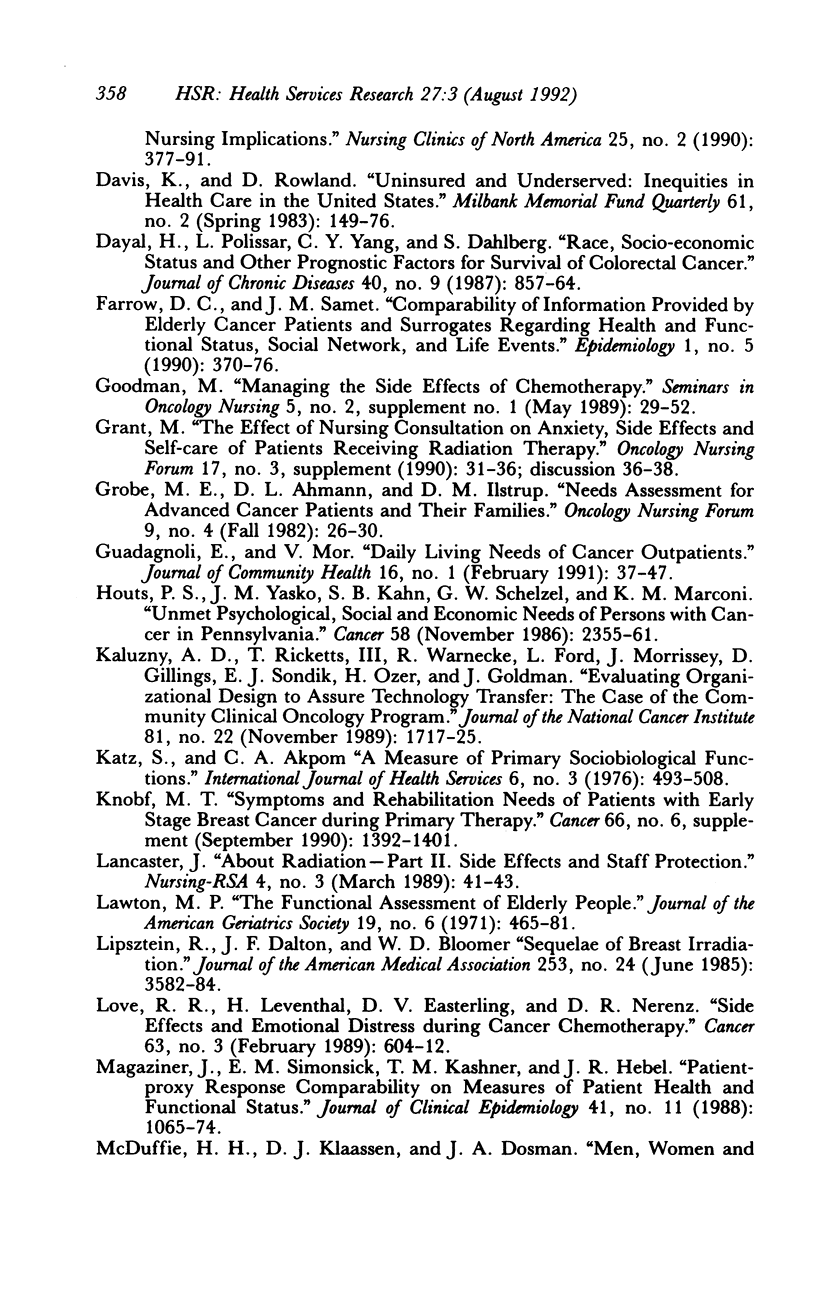
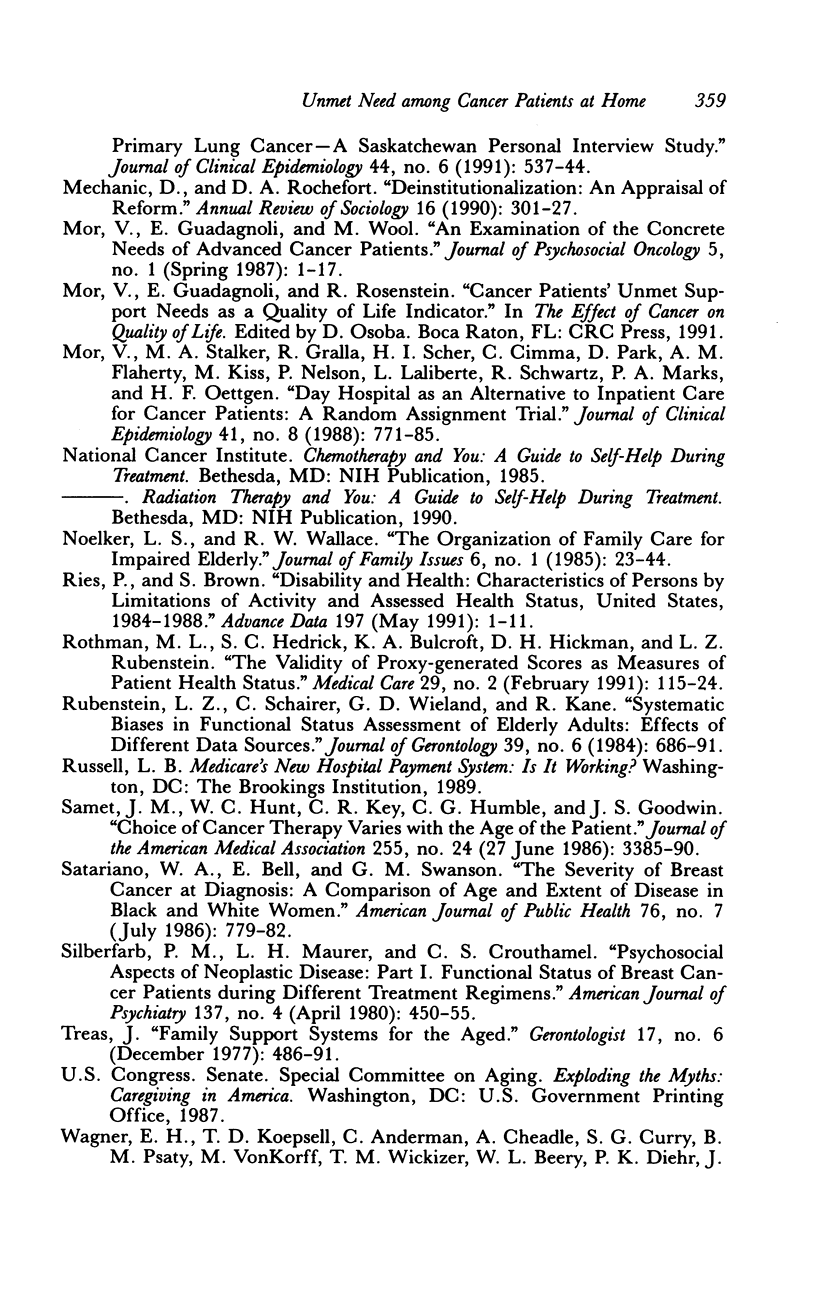
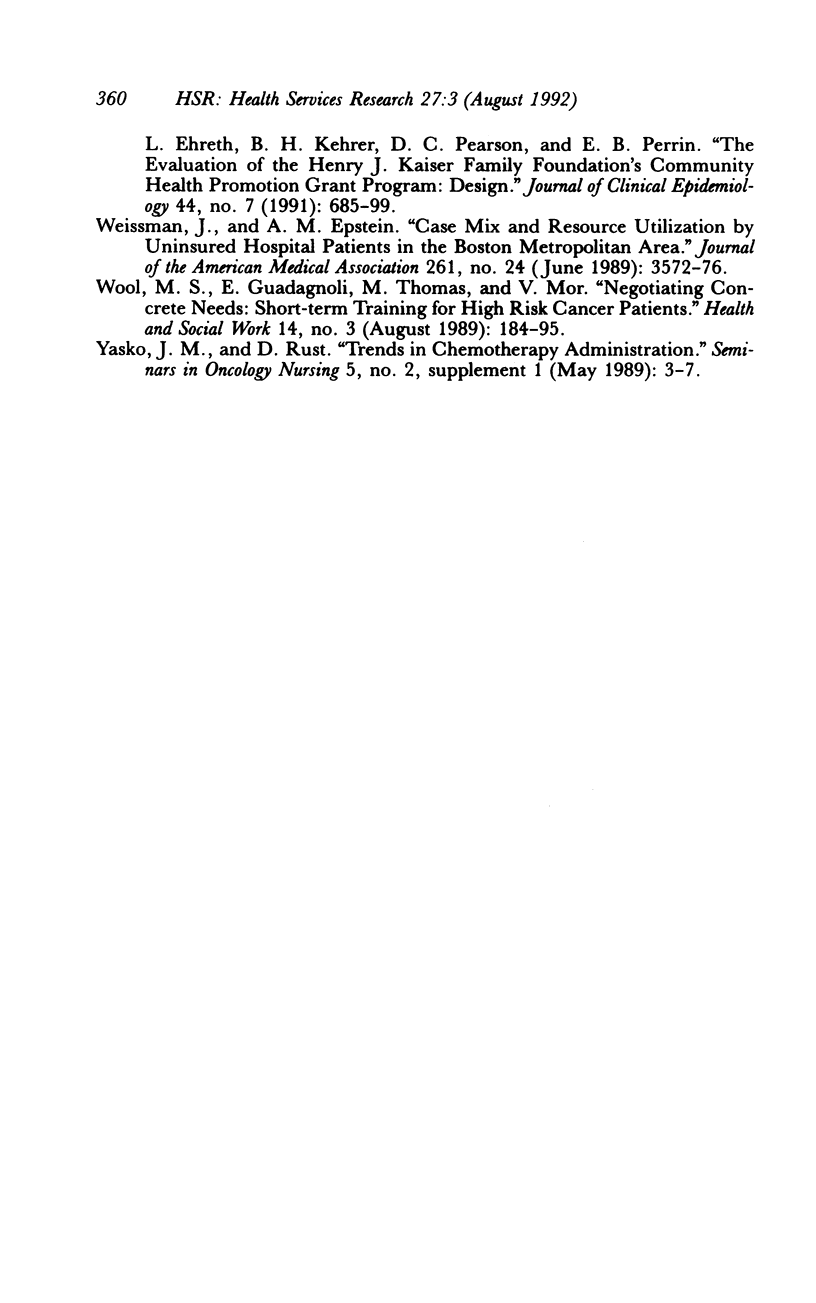
Selected References
These references are in PubMed. This may not be the complete list of references from this article.
- Brody E. M. "Women in the middle" and family help to older people. Gerontologist. 1981 Oct;21(5):471–480. doi: 10.1093/geront/21.5.471. [DOI] [PubMed] [Google Scholar]
- Davis K., Rowland D. Uninsured and underserved: inequities in health care in the United States. Milbank Mem Fund Q Health Soc. 1983 Spring;61(2):149–176. [PubMed] [Google Scholar]
- Dayal H., Polissar L., Yang C. Y., Dahlberg S. Race, socioeconomic status, and other prognostic factors for survival from colo-rectal cancer. J Chronic Dis. 1987;40(9):857–864. doi: 10.1016/0021-9681(87)90185-8. [DOI] [PubMed] [Google Scholar]
- Farrow D. C., Samet J. M. Comparability of information provided by elderly cancer patients and surrogates regarding health and functional status, social network, and life events. Epidemiology. 1990 Sep;1(5):370–376. doi: 10.1097/00001648-199009000-00006. [DOI] [PubMed] [Google Scholar]
- Goodman M. Managing the side effects of chemotherapy. Semin Oncol Nurs. 1989 May;5(2 Suppl 1):29–52. doi: 10.1016/0749-2081(89)90080-6. [DOI] [PubMed] [Google Scholar]
- Grant M. The effect of nursing consultation on anxiety, side effects, and self-care of patients receiving radiation therapy. Oncol Nurs Forum. 1990 May-Jun;17(3 Suppl):31–38. [PubMed] [Google Scholar]
- Grobe M. E., Ahmann D. L., Ilstrup D. M. Needs assessment for advanced cancer patients and their families. Oncol Nurs Forum. 1982 Fall;9(4):26–30. [PubMed] [Google Scholar]
- Guadagnoli E., Mor V. Daily living needs of cancer outpatients. J Community Health. 1991 Feb;16(1):37–47. doi: 10.1007/BF01340467. [DOI] [PubMed] [Google Scholar]
- Houts P. S., Yasko J. M., Kahn S. B., Schelzel G. W., Marconi K. M. Unmet psychological, social, and economic needs of persons with cancer in Pennsylvania. Cancer. 1986 Nov 15;58(10):2355–2361. doi: 10.1002/1097-0142(19861115)58:10<2355::aid-cncr2820581033>3.0.co;2-n. [DOI] [PubMed] [Google Scholar]
- Kaluzny A. D., Ricketts T., 3rd, Warnecke R., Ford L., Morrissey J., Gillings D., Sondik E. J., Ozer H., Goldman J. Evaluating organizational design to assure technology transfer: the case of the Community Clinical Oncology Program. J Natl Cancer Inst. 1989 Nov 15;81(22):1717–1725. doi: 10.1093/jnci/81.22.1717. [DOI] [PubMed] [Google Scholar]
- Katz S., Akpom C. A. A measure of primary sociobiological functions. Int J Health Serv. 1976;6(3):493–508. doi: 10.2190/UURL-2RYU-WRYD-EY3K. [DOI] [PubMed] [Google Scholar]
- Knobf M. T. Symptoms and rehabilitation needs of patients with early stage breast cancer during primary therapy. Cancer. 1990 Sep 15;66(6 Suppl):1392–1401. doi: 10.1002/1097-0142(19900915)66:14+<1392::aid-cncr2820661415>3.0.co;2-t. [DOI] [PubMed] [Google Scholar]
- Lancaster J. About radiotherapy--Part II. Side effects and staff protection. Nurs RSA. 1989 Mar;4(3):41–43. [PubMed] [Google Scholar]
- Lawton M. P. The functional assessment of elderly people. J Am Geriatr Soc. 1971 Jun;19(6):465–481. doi: 10.1111/j.1532-5415.1971.tb01206.x. [DOI] [PubMed] [Google Scholar]
- Lipsztein R., Dalton J. F., Bloomer W. D. Sequelae of breast irradiation. JAMA. 1985 Jun 28;253(24):3582–3584. [PubMed] [Google Scholar]
- Love R. R., Leventhal H., Easterling D. V., Nerenz D. R. Side effects and emotional distress during cancer chemotherapy. Cancer. 1989 Feb 1;63(3):604–612. doi: 10.1002/1097-0142(19890201)63:3<604::aid-cncr2820630334>3.0.co;2-2. [DOI] [PubMed] [Google Scholar]
- Magaziner J., Simonsick E. M., Kashner T. M., Hebel J. R. Patient-proxy response comparability on measures of patient health and functional status. J Clin Epidemiol. 1988;41(11):1065–1074. doi: 10.1016/0895-4356(88)90076-5. [DOI] [PubMed] [Google Scholar]
- McDuffie H. H., Klaassen D. J., Dosman J. A. Men, women and primary lung cancer--a Saskatchewan personal interview study. J Clin Epidemiol. 1991;44(6):537–544. doi: 10.1016/0895-4356(91)90217-w. [DOI] [PubMed] [Google Scholar]
- Mor V., Masterson-Allen S., Houts P., Siegel K. The changing needs of patients with cancer at home. A longitudinal view. Cancer. 1992 Feb 1;69(3):829–838. doi: 10.1002/1097-0142(19920201)69:3<829::aid-cncr2820690335>3.0.co;2-i. [DOI] [PubMed] [Google Scholar]
- Mor V., Stalker M. Z., Gralla R., Scher H. I., Cimma C., Park D., Flaherty A. M., Kiss M., Nelson P., Laliberte L. Day hospital as an alternative to inpatient care for cancer patients: a random assignment trial. J Clin Epidemiol. 1988;41(8):771–785. doi: 10.1016/0895-4356(88)90164-3. [DOI] [PubMed] [Google Scholar]
- Rothman M. L., Hedrick S. C., Bulcroft K. A., Hickam D. H., Rubenstein L. Z. The validity of proxy-generated scores as measures of patient health status. Med Care. 1991 Feb;29(2):115–124. doi: 10.1097/00005650-199102000-00004. [DOI] [PubMed] [Google Scholar]
- Rubenstein L. Z., Schairer C., Wieland G. D., Kane R. Systematic biases in functional status assessment of elderly adults: effects of different data sources. J Gerontol. 1984 Nov;39(6):686–691. doi: 10.1093/geronj/39.6.686. [DOI] [PubMed] [Google Scholar]
- Samet J., Hunt W. C., Key C., Humble C. G., Goodwin J. S. Choice of cancer therapy varies with age of patient. JAMA. 1986 Jun 27;255(24):3385–3390. [PubMed] [Google Scholar]
- Satariano W. A., Belle S. H., Swanson G. M. The severity of breast cancer at diagnosis: a comparison of age and extent of disease in black and white women. Am J Public Health. 1986 Jul;76(7):779–782. doi: 10.2105/ajph.76.7.779. [DOI] [PMC free article] [PubMed] [Google Scholar]
- Silberfarb P. M., Maurer L. H., Crouthamel C. S. Psychosocial aspects of neoplastic disease: I. Functional status of breast cancer patients during different treatment regimens. Am J Psychiatry. 1980 Apr;137(4):450–455. doi: 10.1176/ajp.137.4.450. [DOI] [PubMed] [Google Scholar]
- Treas J. Family support systems for the aged: some social and demographic considerations. Gerontologist. 1977 Dec;17(6):486–491. doi: 10.1093/geront/17.6.486. [DOI] [PubMed] [Google Scholar]
- Wagner E. H., Koepsell T. D., Anderman C., Cheadle A., Curry S. G., Psaty B. M., Von Korff M., Wickizer T. M., Beery W. L., Diehr P. K. The evaluation of the Henry J. Kaiser Family Foundation's Community Health Promotion Grant Program: design. J Clin Epidemiol. 1991;44(7):685–699. doi: 10.1016/0895-4356(91)90029-9. [DOI] [PubMed] [Google Scholar]
- Weissman J., Epstein A. M. Case mix and resource utilization by uninsured hospital patients in the Boston metropolitan area. JAMA. 1989 Jun 23;261(24):3572–3576. [PubMed] [Google Scholar]
- Wool M. S., Guadagnoli E., Thomas M., Mor V. Negotiating concrete needs: short-term training for high-risk cancer patients. Health Soc Work. 1989 Aug;14(3):184–195. doi: 10.1093/hsw/14.3.184. [DOI] [PubMed] [Google Scholar]



